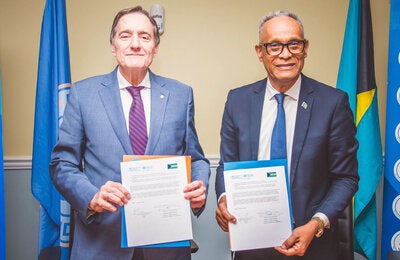

Mexico's Health Secretary, MSc. Salomón Chertorivski Woldenberg, made a working trip to the state of Chihuahua on February 3, 2012, to monitor progress of programs for addiction, accidents and Seguro Popular, as well as the quality of care. In his tour he visited the Observatory for Safety and Peaceful Coexistence of the Juarez Municipality on the premises of the Autonomous University of Ciudad Juarez (UACJ).
Ciudad Juárez, MX., February 5 2012 (PAHO/WHO) — Mexico's Health Secretary, MSc. Salomón Chertorivski Woldenberg, made a working trip to the state of Chihuahua on February 3, 2012, to monitor progress of programs for addiction, accidents and Seguro Popular, as well as the quality of care. In his tour he visited the Observatory for Safety and Peaceful Coexistence of the Juarez Municipality on the premises of the Autonomous University of Ciudad Juarez (UACJ).
The Chancellor of the UACJ, MSc. Javier Sánchez Carlos, said to Secretary Chertorivski that one of the reasons for the success of the Observatory is the great support of the Pan American Health Organization / World Health Organization (PAHO / WHO) U.S.-Mexico Border Office. The Chancellor added that this effort would soon be replicated in three cities of the State of Chihuahua, Parral, Cuauhtémoc and Chihuahua Capital. Furthermore, this experience will allow them to conduct a World Congress of Observatories in Ciudad Juarez.

The Director of the National Council for the Prevention of Accidents (CONAPRA), Dr. Arturo Cervantes Trejo noted that the information generated by the Observatory is already being used in decision-making and to take concrete actions, such is the case of the Transit Municipal General Direction where they are using these sectorial maps for decision-making at the local level, such as deciding where to place patrols and operational control of alcohol depending on where there are recording incidents of alcohol-related traffic. He added that police and transit officials already use all these systems routinely.
The Security Round Table of the "We Are All Juarez" initiative is already one of the most frequent users of the Observatory and especially in the use of valid indicators that are generated; something that has positioned the Observatory said MSc. Ramon Chavira from UACJ. The Security Round Table has considered very useful the survey of perceptions of violence and security, reflecting the sentiments of citizens on their daily lives, conducted by the Observatory. The Technical Secretary of the Observatory, Dr. Sergio Gonzalez Pacheco added that within the Observatory's activities are tracked hemerographic of what the local press and that they are also working with Public Safety Department to track homicides, violence and crime.
The Health Undersecretary of the State of Chihuahua, Dr. Felipe Fornelli, reported on the status of the Comprehensive Care Center and Hospital for Mental Health (CAIHSM), which is ready to provide services to the Juarez community in short stays in case of hospitalization for acute episodes. Dr. Cerqueira said that information is the key to strengthen coordination among units, for example SEDESOL and Transit, who conduct joint audits to identify structural problems affecting the injuries and outrages. Likewise stressed the importance of CAIHSM in the reference system as it is strengthening the primary care of mental health, PAHO / WHO and CEDAT have been training community health workers also know as promotores and the primary care level professionals who need to channel patients to the CAIHSM but not yet able to receive patients. The Observatory is a valuable tool in the strengthening of integral care.
While visiting the facilities the Secretary received several demonstrations of the achievements of the Observatory in the generation of knowledge and information, such as indicators, technical publications of various scientific research and analysis. Another issue highlighted in the framework of his visit are the parallel programs carried out by the PAHO / WHO to contribute in the prevention and control of violence and injuries and strengthening of primary care services in mental health and community care. Among them the Project for Violence and Injury Prevention subsidized by the International Agency of the United States (USAID) implemented by PAHO / WHO and UACJ CONAPRA. As well as the indexing of scientific technical production of the Observatory in the U.S.-Mexico Border Virtual Health Library (BVHL) www.infofrontera.org , to give the information production a greater visibility. PAHO is also providing technical support to establish a Violence and Injury Prevention group as part of the EVIPNet (Evidence Informed Policy Network) Border Network to translate all this knowledge into public policy and actions.
More information
- Photo gallery of Mexico Health Secretary visit https://bit.ly/SSAFeb12
- The Observatory for Safety and Peaceful Co-existence of the Juarez Municipality www.observatoriodejuarez.org
- PAHO/WHO U.S.-Mexico Border Office http://www.paho.org/fep
- Autonomous University of Ciudad Juarez www.uacj.mx/ICSA/Observatorio
- World Health Organization Violence and Injury Prevention www.who.int/violence_injury_prevention/en/
Videos
- About the Observatory https://youtu.be/wgbqoNa2iuA
- Nuestra Frontera news talk show about the Observatory https://youtu.be/VmaruTSgEPQ
- Nuestra Frontera news talk show — interview about with Dr. Arturo Cervantes about Road Safety https://youtu.be/i9JeB6c5izk



